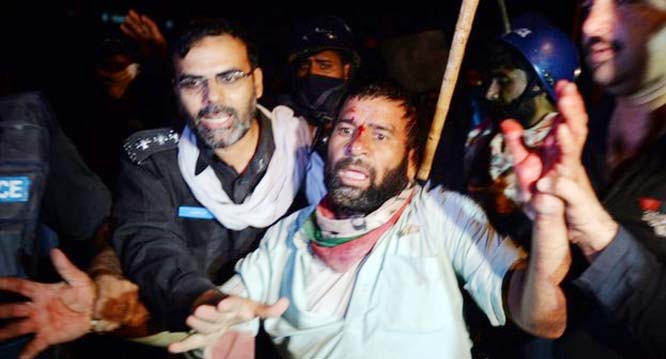
BBC Online :
Clashes are continuing in Pakistan between police and protesters demanding the resignation of PM Nawaz Sharif.
Police again fired tear gas as the demonstrators tried to regroup after a night of violence near Mr Sharif’s residence in the capital, Islamabad.
Two people died during the clashes and at least 300 were injured.
Demonstrators loyal to opposition politician Imran Khan and cleric Tahirul Qadri have been taking part in a sit-in for two weeks.
They want Mr Sharif to resign, alleging corruption and electoral fraud. The prime minister denies the accusation.
Islamabad police chief Khalid Khattak told the BBC that close to 100 protesters had been arrested as the crowds tried to march on Mr Sharif’s official residence in the capital.
Pakistani protesters stand amongst tear gas during clashes with police in Islamabad. “Many of them were armed with axes, hammers and cutters, and I’m sure they also have firearms though we haven’t seen one yet,” he said.
An official at the Polyclinic hospital in Islamabad told reporters that the wounds of those injured were caused by teargas shells, stones and batons.
One protester died of a heart attack in a ditch near the clashes, said Dr Wasim Khawaja, spokesman for the Pakistan Institute of Medical Sciences hospital in Islamabad.
The man, Naveed Razzaq, was a supporter of cleric Tahirul Qadri, AP reports.
On Friday Pakistan’s powerful army chief, Gen Raheel Sharif, stepped in to mediate amid an ongoing deadlock.
Imran Khan ended talks with the government last week.
A government minister said that repeated attempts to resolve the two-week long standoff with protesters had failed.
Speaking to BBC World TV, cleric Qadri condemned the police’s actions as an “unimaginable attack by the state upon the people”, and denied that protesters were armed with weapons.
Local TV pictures showed police throwing tear gas shells, and protesters throwing rocks back at them, some wielding sticks and slingshots.
Military helicopters were despatched to survey the scene on the Constitution Avenue, one of the most secure zones in the city, housing a number of government buildings and residences.
The violence was sparked when the two opposition leaders ordered their supporters, many whom were wielding batons, to move closer to the PM’s house.
The protesters began their sit-in after a huge march from Lahore to Islamabad, vowing to camp out in the capital until the government stood down.
Last year’s elections marked Pakistan’s first civilian transfer of power.

